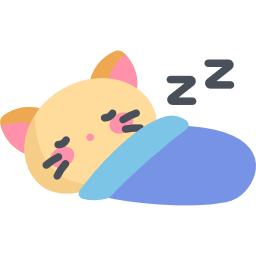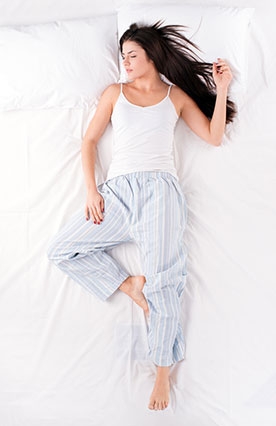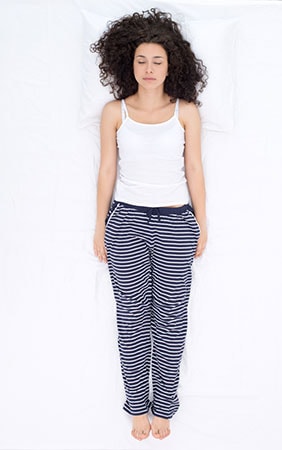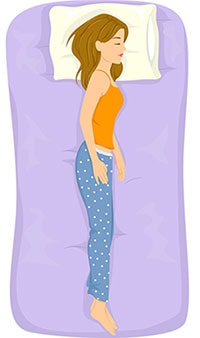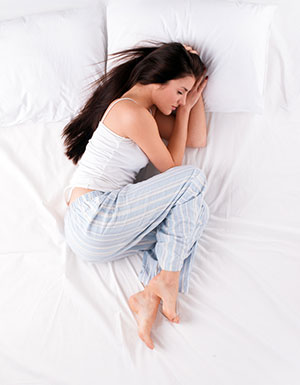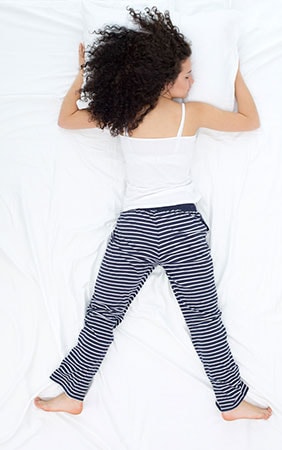
Don’t you hate it when you wake up after full eight hours of sleep, and you still feel tired? Or when you toss and turn all night not being able to fall asleep?
To be honest with you, I love to sleep, but I am not really good at it. Both problems I’ve mentioned come from my personal experience. Fortunately, when I cannot sleep, I turn to problem-solving. Is there a better problem to solve during sleepless nights than my sleeping problem? I don’t think so.
So, I did a lot of research, and I have another question for you – did you know that your sleeping position might be the reason for these troubles?
Yes, more often than not, it is simple as that. And yes, I know, your favorite sleeping position might seem the best, and you wouldn’t trade it for anything in the world, but this article might get you to reconsider this idea.
As I learned more and more about different sleeping positions, I decided to try each one of them for a month and at last, learn how to settle with the healthiest one indefinitely.
I am here today to share all of the important information on what is the best side to sleep on and tried-out tips with you.
Let’s start!
The Importance Of Good Night’s Sleep
6 Devastating Consequences Of Sleep Deprivation
5 Best Sleeping Positions
Conclusion
The Importance Of Good Night’s Sleep
People usually have a general idea that sleep is an essential part of their lives, but they don’t really get how crucial it is for their overall health and well-being. I realized this after a month of poor sleep when my fatigue turned into clumsiness, forgetfulness, emotional outbreaks and repeated cases of inexplicable flu and colds.
Why am I mentioning this here?
Because you need to be aware that your choice of sleeping position can affect the quality and the quantity of the sleep you are getting.
Let’s start with the list of six unexpected sleeping benefits:
Stronger Immunity
From week to week, as I battled one virus after another, I asked myself how is it possible that I am sick all the time, while my wife who shares my bed and kisses me every day is fit as a fiddle?
As I learned, sleep has a protective function when it comes to your immunity. People who sleep seven hours a night or less are about three times more likely to get sick than the people who get eight hours of sleep a night.
At the same time, good night’s sleep enhances the immune system’s ability to store a previous infection in its “memory” and come up with a more effective response in case re-infection happens. This mechanism is the methodology standing behind vaccines, and therefore good sleeping hygiene improves your response to vaccination.
Your Chances Of Getting Laid Will Be Better
Another thing you should know, especially relevant for young people complaining about having poor sex-life is that you should start using your bed for sleeping first, and then sex will just come. No kidding.
A study published in the Journal of Sexual Medicine says that only one hour of extra sleep per night can increase the odds of a woman having sex with her partner by 14%. Also, women who have longer average sleep duration usually report greater vaginal lubrication during sex in comparison to women who sleep less on average.
Improve Your Physical Performance
If you ever tried to run a marathon after partying for a whole weekend, as I did in my 20’s, you know what happens. If you haven’t tried such thing, don’t. Just imagine the pain, nausea and the irresistible desire to lay on the ground in fetal position.
On the other hand, if you go for a marathon and get a few nights of quality sleep before that, your chance of achieving excellent results will be much better. A study done by the team of Stanford University researchers found that college basketball players, who slept at least ten hours a night, for seven or eight weeks had less daytime fatigue, more stamina and improved their average sprint time.
Help You Grow And Develop
You know how our parents and grandparents told us to go to sleep so we can grow?
Well, studies had shown that medically induced slow-wave sleep increases growth hormone release in healthy young adults. However, this doesn’t go only for night’s sleep. Growth hormone levels rise during naps as well.
But, keep in mind that the size of this growth depends on the time of your nap – afternoon is much better than morning.
Protect You From Breast Cancer
You must have heard of melatonin – this hormone is often called the sleep hormone. Essentially, it controls your cycle of sleep and waking. What you probably didn’t know is that melatonin levels are also related to breast cancer. Therefore, sleep duration and quality may pose a protective factor when it comes to breast cancer risk.
Melatonin has a crucial role in this process because it prevents tumor initiation, progression, and promotion. This is a significant finding, and you should make sure everyone around you, but especially women and girls, are getting quality sleep every day.
Boost Your Memory
Once I started sleeping for eight hours a night again, comfortable and in a healthy position, without turning or any sleep interruptions, I realized my memory is much better.
The role of sleep and dreaming in memory consolidation have been speculated for decades, and it is still not completely demystified. However, what we do know is the fact that sleep strengthens and stabilizes new memories, you’ve acquired before sleep. This means, if you study and then go to sleep, you will remember the material better.
At the same time,
Sleep doesn’t just promote the reprocessing of fresh memories and recently acquired knowledge but also aids their integration with the pre-existing long-term memories. In other words, it helps you make associations between the things you already know and the things you’ve just learned.
6 Devastating Consequences Of Sleep Deprivation
1Severe Health Problems
Yes, dealing with the lack of sleep for several weeks or months is bad, but it is not unbearable. It made me grumpy and tired all the time, but I believed I was fine. However, it bugged me, and I draw all of my conclusions from science, so I sat down, opened my laptop, went to Google Scholar and started digging.
Numerous studies have found a strong link between insufficient sleep and severe health conditions, such as heart disease, high blood pressure, heart attacks, strokes, diabetes, and obesity.
This doesn’t mean it’s time to start panicking if you haven’t regularly slept during the last week. Usually, the health risks caused by the sleep loss become serious after years of sleep deprivation. However, after no more than four days, first health hazardous effects can be registered.
1Testosterone Levels And Sex Life
Married couples often struggle to keep the passion in their bedroom. I mean married couples who have no trouble sleeping. What can you expect from sleep-deprived couples than?
The National Sleep Foundation discovered that 26% of people report that their sex lives are suffering simply because they’re too tired.
However, it is not all about the behavior and the psychology; some evidence suggests that the lack of sleep can be associated with the decrease in testosterone levels in men. If you know that quality sleep can improve your sex life, while lack of sleep can impair it, the math is pretty simple.
2Lower Pain Tolerance And Increased Risk Of Injury
Whenever I lose few hours of sleep, I wake up with a headache. Of course, this doesn’t apply to all people – it is just how I react. But, there is a link between sleep deprivation and pain.
If you are suffering from chronic or acute pain, you’ll need at least eight hours of sleep every night to make it hurt less. There is a correlation between lower pain threshold and sleep loss.
Overtired people are more likely to trip, fall, and cut or burn themselves while cooking. They cause significantly more household accidents which can have serious consequences. What worries the most is the fact that the Institute of Medicine reports that drowsy driving causes approximately one out of five auto accidents in the U.S.
3Negative Impact On Your Mental Health
As you already know, when you’re exhausted, you’re more cranky than usual. I am for sure. This is because sleep deprivation affects your emotional regulation. In these situations, you’re more likely to burst into tears, snap at someone who annoys you or start laughing without any apparent reason.
Lack of sleep can also contribute to the symptoms of anxiety and depression. Insomnia and depression are intertwined. Just as sleep loss aggravates its symptoms, depression often makes falling asleep difficult.
4Unexpected Weight Gain
If you want to control or maintain your weight, make sure you sleep well. Sleep loss comes with an increased risk of weight gain. I didn’t gain any weight as I tried to manage my sleeping schedule, but I realized my appetite is different and not in a good way. Sometimes I was craving a bacon burger at night while during the day I couldn’t eat my whole lunch.
On the other hand, Dr. David Rapoport, the director of the NYU Sleep Disorders Program says “Sleep and metabolism are controlled by the same sectors of the brain. When you are sleepy, certain hormones go up in your blood, and those same hormones drive appetite.”
5Impaired Cognitive Skills Are A Real Danger
I already mentioned how quality sleep could boost your memory. Well, there’s a dark side to this story too. Sleep deprivation impairs your cognition, attention, and decision-making. How many times did I forget where I left my car keys, to pick up something from the store or even forgot about the deadline? More than I could count.
If you’ve encountered any of the problems I mentioned above, your lack of sleep might be related to your sleeping position. Don’t worry; I’ll help you identify the problems you’re having.
Also, in the next section, I will give you some personal tips on how to improve your health by switching the sleeping position and make each position a little bit better.
5 Best Sleeping Positions
So, here’s the list of different sleeping positions I’ve been talking about. I tried all of them in my bed, read about them, and I asked for expert opinions, so you can rely on what I am about to say in the next section.
You’ll see I placed them in order from the best to the worst one. To make the whole concept more understandable, I divided following positions into three separate groups, based on the side you are sleeping on – on your back, side or stomach.
Once I start with the list, you will realize it’s not that complicated as it might seem at this point. Without any further ado, the list you’ve all waited for:
The Best Side To Sleep On – On Your Back
Even though sleeping on our back is the healthiest option of all, people rarely choose it. I always believed people who sleep like this are odd fellows who trained themselves to sleep like that on purpose. Only eight percent of people sleep on their back. What can I say, now I am one of them.
Medical Daily consulted several physicians on this topic. Orthopedic spine surgeon from the DISC Sports & Spine Center in L.A., California, Dr. Hooman Melamed says sleeping on your back is “the best position as your spine stays in natural alignment all night long.” This way, no extra curves or pressure are being added to the back, but it might lead to a sore lower back. However, under this category, we have two varieties – starfish and soldier.
1. Starfish
The absolute number one among healthy sleeping positions is the starfish. If you are using this position, it means you’ll be on your back, with your legs spread apart and arms bent up on both sides of your head. Doesn’t sound too comfortable, right? However, I promised myself I would sleep in every position for a month and settle for the starfish as my healthy choice.
I needed to learn a lot about it to justify choosing such seemingly uncomfortable position for myself.
So, what I learned is that starfish is not only good for your back but as Dr. Decontee Jimmeh, a neurologist from Norwood Clinic in Birmingham, Alabama states for Medical Daily “it also combats acid reflux.”
This way, your head is a bit elevated, and your stomach is located below the esophagus, which decreases the chance of digested substances coming back up. Additionally, this position prevents facial wrinkles and various skin breakouts.
However, you should know that it can result in snoring. Also, if you place your arms up, this will add pressure on the shoulder nerves, which can cause pain in this area.
Starfish is really the healthiest position you can choose, but if you are a “freefaller” like I was, you’ll need some adjusting. After a few nights of trying not to turn on my stomach and fall asleep like a baby, I came up with a simple solution.
I placed a pillow under my knees before falling asleep. This was a little bit weird at first, but it offered tons of support for my spine and prevented back pain I was so worried about. To get the most out of starfish, you need to have reliable, firm mattress.
2. Soldier
Another back position that is an excellent alternative to starfish is called – soldier. People sleeping in this position lie flat on their back, with arms by their side. Getting used to this position wasn’t a breeze. I am a guy who loves to move his extremities during sleep. Well, I imagined the soldier as an equal to being tied down.
It didn’t really help me when I found out that although it does provide solid back support and helps with acid reflux, in comparison to starfish, soldier has a few cons.
Just like starfish, it can cause snoring, which may lead to sleep disruption and problems with the carotid artery. Also, if you have sleep apnea, you might want to consider switching to some other position.
To be honest, before I got used to sleeping in “starfish” position, I tried the “soldier” first. It seemed somewhat cozier to me, especially for chilly winter days when I prefer to wrap myself in a blanket as tight as I can. If you want to improve your soldier, take my advice on improving the “starfish.”
Place a pillow, or a rolled up blanket or towel under your knees. This will support the natural curve of your spine and prevent the potential back pain, and keep you warm and snuggled during cold days.
The Acceptable Choice – Sleeping On Your Side
Sleeping on your side is probably the most popular sleeping position among adults. This is good news because it has numerous advantages. For example, patients with obstructive sleep apnea can benefit from it, just as pregnant women and people who are prone to snoring, back and neck pain.
For me, switching from sleeping on the stomach to sleeping on the side wasn’t such a problem. I decided to step by step. Stomach, side, side, back, back. That was the plan.
I liked the idea of sleeping on a side as it mechanically opens up a crowded oropharynx and elongates the spine. However, it might cause unwanted skin aging and lead to saggy breasts.
If you are sleeping on your side, you have a few options – right and left side and two positions – fetal and log. Dr. Melamed said for Medical Daily that if you are a side-sleeper, choosing the right mattress also matters “You should choose a softer mattress to avoid press points but not one so soft that it doesn’t properly support your neck.”
Which side to choose?
If you thought the actual side you are sleeping on is irrelevant, you are mistaken. If you choose the right side, you are putting yourself at risk of potential heartburn. As a clinical psychologist, Dr. Michael Breus, also known as the Sleep Doctor explains “sleeping on your right pushes on blood vessels, preventing maximum circulation.”
However, the left side can put a strain on internal organs such as the lungs, liver, and stomach. At the same time, it does reduce acid reflux just as well as sleeping on your back. Pregnant women are usually advised to sleep on their left side to ensure optimal blood flow.
When you are aware of both advantages and disadvantages of both sides, the advice that comes from the doctors at The Cleveland Clinic seems logical – switch sides during the night!
For a toss-and-turner like me, this was the dream; when I read this article, I already imagined myself turning like a turbine in bed. Luckily for my wife, things were a little more subtle.
3. Log
People who prefer sleeping on their side with both arms down, close to their body are choosing the position called – the log. Think of a tree that has been chopped down and has just fallen on the ground. That is what log sleeping looks like – as if you were frozen and you fell on your side and decided to sleep like that. 15% of people use this position, which is excellent because it is good for health.
As the back is mostly straight, it cuts down on sleep apnea. Also, log position keeps your spine aligned, which means there is no risk of neck or back pain.
If you are not a log sleeper, this can be odd. It was hard for me to even imagine how anyone can enjoy this. However, I decided to try all of the sleeping positions for a month, and I think I succeeded, though I kept falling back on my stomach when I fade out.
I read a lot of scientific articles and talked with the professionals and this is what they all agreed on – sleeping in the “log” position is much more comfortable when you ease the pressure on your hips. You can do this by simply placing a soft pillow or folded towel between your knees.
4. Fetal
As statistics say, 4 out of 10 people, especially women, choose to sleep in the fetal position. In general, it is a good choice because it leaves your spine resting in its natural alignment. Dr. Lou Bisogni, New York chiropractor, advises that if you sleep in fetal position, you should place a “pillow between your knees, which keeps the pelvis level and reduces the chances of lower back irritation, stiffness or pain.”
Also, some results suggest that fetal position might help decrease the chance of conditions like Alzheimer’s or Parkinson’s. Supposedly, our brain does a better job clearing waste when we’re sleeping on our side rather than on our back or stomach.
As I previously mentioned, combining fetal position with left side can be beneficial for pregnant women, as it improves baby’s circulation and prevents mother’s uterus from pressing against her liver.
Unfortunately, it can cause a strain on your back and joints, especially if you keep your knees and chin tucked into your chest.
I don’t know if that’s a coincidence or great minds sleep alike, but my wife is also a “freefaller.” When she was pregnant with our first child, her doctor suggested switching to fetal position to provide our future baby with the best possible care. However, she said there is no use of trying to sleep in this position if the mother is suffering or ending up sleep deprived because of it.
Her advice was to stretch out a little bit.She said, if you pull your body into a tight ball or curl forward too much, it will limit your lungs and the diaphragm. The key is to keep your back relaxed to encourage easy breathing.
The Dark Side of Sleeping – On Your Stomach
Can you imagine how hurt I was when I realized my favorite sleeping position is the worst? Even though it is incredibly comfortable, sleeping on your stomach is never advised.
It leads to overarching as it doesn’t support the natural curve of your spine. At the same time, it places pressure on joints and muscles, causing pain, tingling, and numbness. As Vivian Eisenstadt, a well-known physical therapist based in Los Angeles, California explains, sleeping on your stomach “forces your neck to be in a rotated, closed pack, tight position, which also compromises your breathing and circulation.”
However, stomach-sleeping can be effective for those who snore, because it keeps the upper airways open. The most common position from this group is called freefall.
5. Freefall
People who are sleeping in freefall, like my wife and me, are lying on their stomach, with arms tucked under a pillow or resting on either side of their head. I still sometimes fall asleep like this if I am incredibly tired. It is a luxury I can afford from time to time, now that I am officially a starfish sleeper.
As I stated,
Freefall usually leads to lower back and neck pain. It also makes people toss and turn around more, as they are trying to get comfortable on their belly.
I wasn’t really surprised when I found out my favorite sleeping position is at the same time the worst one. As they say, the best things in life are either expensive, illegal or bad for your health. Well, so is the freefall. At first, when I believed there is no way to change your sleeping position, so I tried to find a way to make freefall better.
What I found out is that if you have to sleep in this position, you should avoid using firm pillows. This puts your neck at an awkward angle and causes pain. If it is possible, prop a softer pillow under your forehead, and face the mattress, instead of turning your head to one side. This might be difficult at first, but it will keep your airway open.
Conclusion
Sleeping positions play a significant role in the quality and the quantity of sleep you are getting every night. Choosing the best side to sleep on is just as important as choosing the right type of mattress, having good sleeping hygiene and adjusting your sleeping environment.
Now that you know what sleep deprivation can do to your body, and which pros and cons come with each sleeping position, you can choose the right one for yourself.
I wish you sweet dreams, and if you have any questions or suggestion about this topic, make sure to leave me a comment before you doze off.



